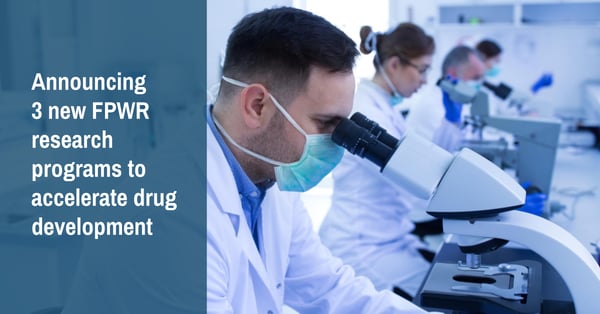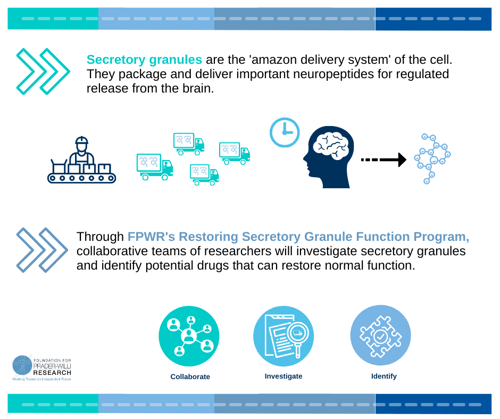With the support of the John C. Storr and Suzanne M. Storr Foundations, FPWR is excited to announce the launch of three new research programs designed to translate findings from the lab to human clinical trials, accelerating the development of new treatments for PWS.
 Each 4-year program leverages discoveries from FPWR-supported research, fuels exciting new collaborations, and takes a coordinated approach to find and develop new therapeutics for PWS.
Each 4-year program leverages discoveries from FPWR-supported research, fuels exciting new collaborations, and takes a coordinated approach to find and develop new therapeutics for PWS.
Program 1: Restoring Secretory Granule Function

Secretory granules (SG) serve as the "Amazon" delivery vehicles of the cell, packaging important neuropeptides such as oxytocin and vasopressin for regulated release in the brain. Previous FPWR-funded studies by Drs. Potts, Reiter and colleagues have shown that PWS neurons have deficiencies in SG biology (Chen et al), which results in reduced neuropeptide and hormone release, and may underlie many of the clinical problems in PWS. Thus, restoring SG function could offer a new therapeutic strategy to simultaneously correct many clinical aspects of the PWS, from growth hormone deficiency to hunger to anxiety.
Through this program, we will fund collaborative teams to investigate how SG deficits arise in PWS and determine the potential therapeutic benefit of correcting this deficit. The program will support the development of research tools, such as antibodies and genetically modified cell lines, which can be used to screen for drugs that may restore normal SG function. Candidate drugs that show promise during screening will be advanced and evaluated in PWS cell and animal models, in preparation for human clinical trials.
Program 2: Drug Screen Development
.png?width=500&name=Directed%20Research%20Programs%20Infographic%20(1).png)
FPWR has funded the development of PWS stem cells, which can be guided into producing PWS 'brains in a dish'. Molecular analysis of these cells has begun to yield insights into how PWS neurons differ from typical neurons, and which molecular pathways might provide rational targets for therapeutic development.
This program seeks to build on the success to date in understanding cellular changes in PWS and use that information to identify new drugs to treat PWS. Through this program, we will foster collaborative work among research teams investigating PWS cell models and support the development of cellular assays for drug screening. Drugs identified through cellular screens could impact a variety of PWS symptoms, from cognition to appetite regulation.
Program 3: Therapeutic Accelerator Program
-1.png?width=500&name=Directed%20Research%20Programs%20Infographic%20(2)-1.png)
Several FPWR-funded projects have identified candidate cellular 'pathways' that are altered in PWS. These pathways may offer viable targets for new therapies, and in most cases, drugs have already been identified that may modulate these pathways. The Therapeutic Accelerator Program will establish the validity of each of these therapeutic avenues in PWS, efficiently prioritizing the approaches that are most promising and advancing the best approaches to human clinical trials. FPWR will work directly with each research team to identify, engage and support the research expertise needed to complete targeted studies that will inform 'go/no go' decisions on each therapeutic avenue.
FPWR is excited to advance each of these programs in our efforts to find new therapies for our loved ones with PWS.
We would like to thank John Storr and Suzanne Storr whose support has made these programs possible.
Learn more about FPWR research programs.








